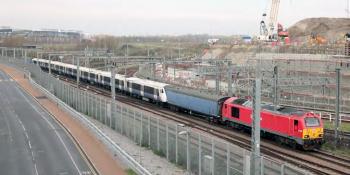NEW 15-YEAR FRANCHISE FOR WALES

TRANSPORT FOR Wales Rail Services commenced operation of Wales and Borders services on 14 October, marking the end of the ‘no growth’ contract awarded to Arriva in 2003.
The new 15-year contract, awarded to KeolisAmey, takes a more realistic view of passenger demand, promising a 29% increase in weekday services by the end of 2023 and a 28% increase in Sunday mileage from December 2022. £783 million is earmarked for capital investment in local railways in South East Wales, primarily electrification and capacity enhancements on the Core Valley Lines (CVL) north of Cardiff Queen Street. The UK Government is expected to transfer approximately
£900 million to the Welsh Government for CVL operation, maintenance and renewal after the CVL are transferred from Network Rail ownership next autumn.
Welsh Transport Secretary Ken Skates explained that with a further £3 billion in revenue support over the 15 years, the new contract involves about £4.7 billion of public expenditure in total.
The new operator faces challenges in the immediate future, pending delivery of new trains. Initially it is reliant on the fleet inherited from Arriva Trains Wales, mostly of British Rail origin. Only recently have modifications commenced for Persons with Reduced Mobility (PRM) compliance, depleting the ageing fleet while units are away at works for attention. Technical setbacks during Class 769 development prevented KeolisAmey (branded as TfW Rail Services) from operating five Class 769s from the start of the contract, as had been expected during the procurement.
Class 769s and other cascaded stock will ease the pressure next year and enable withdrawal of Pacers. The legacy fleets will receive an investment of £40 million, primarily refurbishment works that will generally be undertaken at the same time as PRM modifications. The Class 158 fleet will belatedly receive attention to its unreliable air conditioning equipment.
TfW Rail Services immediately introduced Delay Repay in the standard industry format. This applies to delays of 30 minutes and more until the end of January, when the threshold will reduce to 15 minutes.
EU FUNDING FOR VALLEYS UPGRADE
On 4 October, the Welsh Government said European Union funding had been secured to deliver the first stages of the CVL modernisation. Concerns over the funding had been raised after the EU referendum in 2016. Although £119 million of funding is confirmed, it can be drawn down only if modernisation of the Taff lines (Merthyr Tydfil, Aberdare and Treherbert to Cardiff) is completed by the end of 2022, with tram-trains drawing electricity from overhead equipment and batteries.
The EU funding will provide additional loops or double tracking for the future service frequency of 4tph (trains per hour), twice the current frequency, on each line north of Pontypridd. This will entail provision of new platforms at some stations. It also includes £19.5 million for track and other infrastructure works between Bargoed and Rhymney to enable 4tph frequency.
The EU grant will also fund initial works on the tram-train depot at Taff’s Well, including land purchase and installation of road and rail access. The Welsh Government hopes to secure further EU funding of at least £40 million for the modernisation by the end of this year.
Andrew Haines, Network Rail’s Chief Executive, welcomes the CVL plans, and not solely because he hails from Merthyr Tydfil! He told the House of Commons Transport Committee: ‘I am a supporter of the Core Valley Lines transfer to Transport for Wales. If a funder there thinks they can do a better job, that would be useful. It is a relatively ringfenced impact. My parents will not thank me for saying that, but that is the sort of small-scale activity that allows you to do things.’
PERFORMANCE ON THE UP
Network Rail’s Wales & Borders Route has expressed pride in the assets it will transfer, particularly in view of the improvement in performance since completion of Cardiff Area Signalling Renewal (CASR) in 2016. Comparison of the most recent year with the year before CASR commissioning reveals that PPM (Public Performance Measure) improved by 1.7% and the proportion of right-time arrivals by 5.6%.
Bill Kelly, interim Route Managing Director for Network Rail Wales & Borders, said: ‘This improvement brings performance back to the historic high levels achieved during CP4 (Control Period 4, 2009-14), despite the unprecedented increase in passenger numbers which has caused somewhat of a capacity challenge on the Core Valley Lines.’
He said Network Rail looked forward to working closely with TfW on delivery in South Wales. ‘As well as the infrastructure improvements planned by TfW pending the transfer of the Core Valley Lines, we will also be working with the new operator to improve the day-to-day running of the railway through more rigorous performance measures.
‘Similarly, our plans for CP6 (2019-24) are focused on operations, maintenance and renewals, which will see a significant number of diverse schemes to deliver as many benefits as possible for passengers at a local level.’ Rhodri Clark




